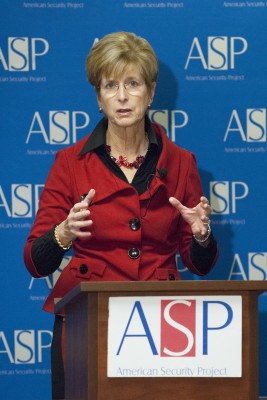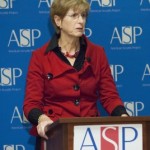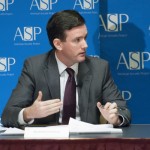
The Future of Nuclear Power: A Conversation with Christine Todd Whitman
Podcast: Play in new window | Download
Subscribe: Apple Podcasts | RSS
ASP Board Member, former New Jersey Governor, and former EPA Administrator Christine Todd Whitman spoke at the American Security Project on Tuesday, November 20 on the topic of nuclear power. Whitman argued that the United States needs a reliable, safe, affordable, and clean source of energy. She explained that natural gas prices are volatile, oil and coal are too dirty for the environment, and renewable energy cannot be relied upon. She said that when the wind is not blowing and the sun is not shining, the country would still need a reliable base load power source.
Nuclear energy, while no silver bullet, can help the US meet its energy needs and serve as a reliable base load power source. 
Whitman argued that the opposition to nuclear energy is not convincing. New training procedures and safety measures passed by the Nuclear Regulatory Commission (NRC) address and mitigate the issues that caused the incidents at Three Mile Island and Fukushima. Whitman also addressed the issue of nuclear waste. Whitman acknowledged this was one of the major problems holding back nuclear power. However, Whitman has not given up on storing nuclear waste in Yucca Mountain. She also stated that nuclear waste can be reduced in volume. Nuclear waste rods are 95%-97% full of fissionable material. The French reprocess their nuclear waste, allowing them to reduce that amount to 3%.
Finally, Whitman argued that nuclear power has both environmental and economic benefits. Currently, 20% of America’s electricity comes from nuclear power. As nuclear power does not emit any carbon dioxide emissions, it is cleaner than natural gas, oil, and coal. She also made an economic argument, saying it takes 1500-3500 people to build a nuclear power plant. Nuclear power plants also employ 300-500 people of various skill levels full time. Local communities earn around $470 million per year from a nuclear reactor.
 ASP Senior Fellow on Energy and the Climate Andrew Holland asked Whitman about the future of nuclear energy given that several US nuclear power plants are going offline soon; meaning that the US will not have the 104 nuclear power plants it has today. Whitman responded that 4 new reactors are being built in South Carolina and Georgia that are using new technology and reactors. The experience with these new reactors has allowed the NRC to become more knowledgeable and comfortable with emerging designs. This experience will allow the NRC to process new permit requests more quickly. Holland also asked about the possibility of subsidizing nuclear energy. Whitman answered that all forms of energy are subsidized in some form by the government, but what the government needed to do is provide lenders some certainty. Starting a new nuclear reactor requires borrowing money, but people will only lend if they believe the government will continue to back the project and not change its policies toward nuclear energy.
ASP Senior Fellow on Energy and the Climate Andrew Holland asked Whitman about the future of nuclear energy given that several US nuclear power plants are going offline soon; meaning that the US will not have the 104 nuclear power plants it has today. Whitman responded that 4 new reactors are being built in South Carolina and Georgia that are using new technology and reactors. The experience with these new reactors has allowed the NRC to become more knowledgeable and comfortable with emerging designs. This experience will allow the NRC to process new permit requests more quickly. Holland also asked about the possibility of subsidizing nuclear energy. Whitman answered that all forms of energy are subsidized in some form by the government, but what the government needed to do is provide lenders some certainty. Starting a new nuclear reactor requires borrowing money, but people will only lend if they believe the government will continue to back the project and not change its policies toward nuclear energy.
Ultimately, Whitman concluded that the country needed Congress to pass a national energy plan that laid out the future for the country’s infrastructure and energy.
Click below to listen to the event:
Check out the photos on Flickr:







[…] The Future of Nuclear Power: Christine Todd Whitman […]